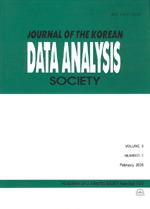시간 제약 제시 방식이 과제 수행에 미치는 영향
The effect of time constraint presentation method on task performance*
- 한국자료분석학회
- Journal of The Korean Data Analysis Society (JKDAS)
- Vol.24 No.2
-
2022.04903 - 918 (16 pages)
-
DOI : 10.37727/jkdas.2022.24.2.903
- 92

시간 제약은 과제 수행 시 인지 부하를 야기해 수행을 떨어트리기도 하고, 적절한 긴장감을 유도해 과제에 더 집중하게 만들기도 한다. 본 연구는 시간 제약의 제시 방식을 다르게 했을 때 과제의 난이도에 따라 시간 제약의 효과에 차이가 나는지를 확인하고자 하였다. 이를 위하여 실험 1에서는 카운트 다운, 카운트 업, 통제 조건 하에서 난이도가 다른 수식 과제를 수행하였을 때 수행에 차이가 나는지를 살펴보았다. 실험 결과, 소비한 시간이 점차 쌓여가는 조건(카운트업)의 경우에 어려운 난이도의 수식 과제 수행 시의 과제 정확률이 시간이 제시되지 않은 조건(통제)과 남은 시간이 줄어드는 조건(카운트 다운)에 비해 유의미하게 낮았다. 실험 2에서는 다른 유형의 과제를 수행할 때 동일한 결과가 나타나는지를 확인하기 위해 삼단논법추론 과제를 사용하였다. 그 결과 통제 조건과 비교하여 카운트 업 조건의 수행률은 낮게 나타났고, 카운트 다운 조건의 수행률은 높게 나타났다. 이러한 결과는 카운트 업 조건이 카운트 다운 조건보다 더 많은 인지적 부담을 일으킨다는 것을 시사하며 동일한 시간 내에 과제를 수행해야 하는 상황이라고 할지라도 시간을 제시하는 방식에 따라 과제 수행이 달라질 수 있다는 것을 보여준다.
Time constraint has several effects on individual task performance in daily life. On the one hand, it causes cognitive load when performing a task, and on the other hand, it induces attention to focus more on the task. In this study, we examined whether the presentation method of time constraint affects the effect of time constraint differently depending on the difficulty of the task. To do so, in Experiment 1, mathematical tasks of different difficulty were performed under count down, count up, and control conditions. As a result, in case of the count up condition, the accuracy of the task was significantly lower than that of the control condition and the count down condition when solving difficult mathematical questions. In Experiment 2, a syllogistic reasoning task was used. In this experiment, compare to the control condition, the accuracy of the count up condition was low, and the accuracy of the count down condition was higher. These results suggest that count up condition causes more cognitive load. The results also show that task performance varies depending on the way the time is presented even in situation where tasks are performed within the same time period.
1. 서론
2. 연구 1
3. 연구 2
4. 종합 논의
(0)
(0)